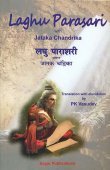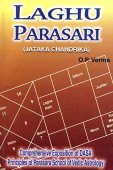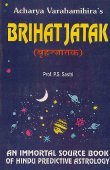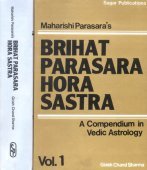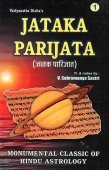Parashara, Parasara, Pārāsara, Parāśara, Pārāśara: 28 definitions
Introduction:
Parashara means something in Buddhism, Pali, Hinduism, Sanskrit, the history of ancient India, Jainism, Prakrit. If you want to know the exact meaning, history, etymology or English translation of this term then check out the descriptions on this page. Add your comment or reference to a book if you want to contribute to this summary article.
The Sanskrit terms Parāśara and Pārāśara can be transliterated into English as Parasara or Parashara, using the IAST transliteration scheme (?).
In Hinduism
Purana and Itihasa (epic history)
Source: archive.org: Puranic Encyclopedia1) Parāśara (पराशर).—Genealogy. Descending in order from Viṣṇu—Brahmā -Vasiṣṭha—Śakti—Parāśara. (See full article at Story of Parāśara from the Puranic encyclopaedia by Vettam Mani)
2) Parāśara (पराशर).—A serpent born of the family of Dhṛtarāṣṭra. This was burnt to death at the sarpasatra of Janamejaya. (Śloka 19, Chapter 57, Ādi Parva).
Source: archive.org: Shiva Purana - English TranslationParāśara (पराशर) is the name of a Sage (Muni) who once attended a great sacrifice by Dakṣa, according to the Śivapurāṇa 2.2.27. Accordingly as Brahmā narrated to Nārada:—“[...] once a great sacrifice was started by Dakṣa, O sage. To partake in that sacrifice, the celestial and terrestrial sages and devas were invited by Śiva and they reached the place being deluded by Śiva’s Māyā. [Parāśara, ...] and many others along with their sons and wives arrived at the sacrifice of Dakṣa—my son”.
Source: Cologne Digital Sanskrit Dictionaries: The Purana Index1a) Parāśara (पराशर).—The son of Śakti and Adṛśyantī; wife Kālyā (Satyavatī, Acchoda Matsya Gandhi) and son Kṛṣṇadvaipāyana;1 a Ṛṣika became sage by satya;2 a pupil of Yājñavalkya;3 of Bāṣkala, a Vāsiṣṭha;4 a Śrutaṛṣi;5 a Vedavyāsa6 of the 26th dvāpara; heard the br. purāṇa (vāyu p.) from Śakti when in embryo and narrated it to Jātu— karṇi;7 praised Śiva, out to destroy Tripura;8 invited for the Rājasūya of Yudhiṣṭhira,9 came to see Parīkṣit preaching prāyopavesa;10 questioned by Maitreya on the origin of the world etc: narrated the Bhāgavata to the sage;11 recollected Vasiṣṭha's narration to him of his father's death at the hands of a Rākṣasa set up by Viśvāmitra: his anger and the sacrifice he performed for the extinction of the Rākṣasas;12 The advice of Vasiṣṭha, his grand-father, to abate his anger because fate must run its course and anger was unworthy of the wise: his compliance;13 the arrival of Pulastya the son of Brahmā, who granted P. boons comprising knowledge of the sāstras, authorship of viṣṇu purāṇa and correct knowledge of the truth about Gods and Karma: the conformation of the boons by Vasiṣṭha: states that the Universe is born of Viṣṇu, depends on him and is Sahiṣṇu avatār of the Lord;14 praise of Hari having realised the Yoga power of Hari.15
- 1) Bhāgavata-purāṇa I. 3. 21; 4. 14; VI. 15. (14); IX. 22. 21; XII. 6. 49, 55; Brahmāṇḍa-purāṇa I. 1. 9; 2. 12; III. 8. 91; Matsya-purāṇa 14. 15; 47. 246; 201. 31; Vāyu-purāṇa 70. 83.
- 2) Brahmāṇḍa-purāṇa II. 32. 102.
- 3) Ib. II. 35. 29; Vāyu-purāṇa 77. 74; Viṣṇu-purāṇa III. 4. 18.
- 4) Brahmāṇḍa-purāṇa II. 32. 115.
- 5) Ib. II. 33. 3; Matsya-purāṇa 145. 96, 109.
- 6) Brahmāṇḍa-purāṇa II. 35. 124; Vāyu-purāṇa 23. 212.
- 7) Brahmāṇḍa-purāṇa IV. 4. 65-6; Vāyu-purāṇa 61. 47; 103. 65; 106. 35.
- 8) Matsya-purāṇa 133. 67.
- 9) Bhāgavata-purāṇa X. 74. 8.
- 10) Ib. I. 19. 9; Vāyu-purāṇa 1. 138; 2. 12.
- 11) Bhāgavata-purāṇa III. 8. 8; Viṣṇu-purāṇa I. 1. 1-10.
- 12) Ib. I. 1. 11-14.
- 13) Ib. I. 1. 15-21.
- 14) Vāyu-purāṇa 23. 212; Viṣṇu-purāṇa I. 1. 22-31.
- 15) Bhāgavata-purāṇa II. 7. 45; Viṣṇu-purāṇa II. 2. 7.
1b) The son and pupil of Kuśumi.*
- * Brahmāṇḍa-purāṇa II. 35. 42.
1c) A son of Ṛṣabha avatār of the Lord.*
- * Vāyu-purāṇa 23. 144.
1d) A Mantra-brāhmaṇa-kāraka and resident of Brahmakṣetra.*
- * Vāyu-purāṇa 59. 105.
2) Pārāśara (पाराशर).—A disciple of Bhāṣkali who gave him the third śākhā of the Ṛg Veda.*
- * Brahmāṇḍa-purāṇa II. 34. 27. Vāyu-purāṇa 60. 26.
Parāśara (पराशर) is a name mentioned in the Mahābhārata (cf. I.52.17, I.57, I.63.69, I.63, I.90.52) and represents one of the many proper names used for people and places. Note: The Mahābhārata (mentioning Parāśara) is a Sanskrit epic poem consisting of 100,000 ślokas (metrical verses) and is over 2000 years old.
Source: Shodhganga: The saurapurana - a critical studyParāśara (पराशर) is the son of Śakti and grandson of Vasiṣṭha and Arundhatī, according to one account of Vaṃśa (‘genealogical description’) of the 10th century Saurapurāṇa: one of the various Upapurāṇas depicting Śaivism.—Accordingly, Nārada gave a daughter to Vasiṣṭha. She was Arundhati and Śakti was born to her. Śakti begot Parāśara and from Parāśara was born Kṛṣṇa Dvaipāyana. Śuka was born to Dvaipāyana and Śuka had five sons—Bhūriśravā, Prabhu, Śaṃbhu, Kṛṣṇa and Gaura and a daughter—Kīrtimati.

The Purana (पुराण, purāṇas) refers to Sanskrit literature preserving ancient India’s vast cultural history, including historical legends, religious ceremonies, various arts and sciences. The eighteen mahapuranas total over 400,000 shlokas (metrical couplets) and date to at least several centuries BCE.
Kavya (poetry)
Source: Shodhganga: The Kavyamimamsa of RajasekharaParāśara (पराशर) is the name of an important person (viz., an Ācārya or Kavi) mentioned in Rājaśekhara’s 10th-century Kāvyamīmāṃsā.—One of the eighteen disciples of Kāvya-puruṣa. In the Purāṇas have been describes very much about the character of Parāśara. He was the son of Śakti and father of Vyāsadeva. He also wrote another Smṛitiśāstra known as Parāsarasmṛiti, which is the authority for the Kaliyuga.

Kavya (काव्य, kavya) refers to Sanskrit poetry, a popular ancient Indian tradition of literature. There have been many Sanskrit poets over the ages, hailing from ancient India and beyond. This topic includes mahakavya, or ‘epic poetry’ and natya, or ‘dramatic poetry’.
Pancaratra (worship of Nārāyaṇa)
Source: Shodhganga: Iconographical representations of Śiva (pancaratra)Parāśara (पराशर) or Parāśarasaṃhitā is the name of a Vaiṣṇava Āgama scripture, classified as a sāttvika type of the Muniprokta group of Pāñcarātra Āgamas. The vaiṣṇavāgamas represent one of the three classes of āgamas (traditionally communicated wisdom).—Texts of the Pāñcara Āgamas are divided in to two sects. It is believed that Lord Vāsudeva revealed the first group of texts which are called Divya and the next group is called Muniprokta which are further divided in to three viz. a. Sāttvika (e.g., Parāśara-saṃhitā). b. Rājasa. c. Tāmasa.

Pancaratra (पाञ्चरात्र, pāñcarātra) represents a tradition of Hinduism where Narayana is revered and worshipped. Closeley related to Vaishnavism, the Pancaratra literature includes various Agamas and tantras incorporating many Vaishnava philosophies.
Vedanta (school of philosophy)
Source: Shodhganga: Siva Gita A Critical StudyParāśara (पराशर) or Parāśaragītā refers to one of the sixty-four Gītās commonly referred to in Hindu scriptures.—Gītā is the name given to certain sacred writings in verse (often in the form of a dialogue) which are devoted to the exposition of particular religious and theosophical doctrines. Most of these Gītās [i.e., Parāśara-gītā] originate from the Mahābhārata or the various Purāṇas.

Vedanta (वेदान्त, vedānta) refers to a school of orthodox Hindu philosophy (astika), drawing its subject-matter from the Upanishads. There are a number of sub-schools of Vedanta, however all of them expound on the basic teaching of the ultimate reality (brahman) and liberation (moksha) of the individual soul (atman).
Yoga (school of philosophy)
Source: Brill: Śaivism and the Tantric Traditions (yoga)Parāśara (पराशर) refers to one of the seven Sages, according to the 17th-century Haṭhayogasaṃhitā: a compilation on Haṭhayoga that borrows extensively from the Haṭhapradīpikā. The opening verses (1.2–3) acknowledge the seven sages, namely Mārkaṇḍeya, Bharadvāja, Marīci, Jaimini, Parāśara, Bhṛgu and Viśvāmitra, for spreading Haṭhayoga in the world. [...] The Haṭhayogasaṃhitā appears to have been the basis of the Gheraṇḍasaṃhitā (eighteenth century), [...]

Yoga is originally considered a branch of Hindu philosophy (astika), but both ancient and modern Yoga combine the physical, mental and spiritual. Yoga teaches various physical techniques also known as āsanas (postures), used for various purposes (eg., meditation, contemplation, relaxation).
Jyotisha (astronomy and astrology)
Source: Wisdom Library: Brihat Samhita by VarahamihiraParāśara (पराशर) is the name of a Ṛṣi and an expert in Astronomy, according to the Bṛhatsaṃhitā (chapter 17) (“On planetary conjunctions—grahayuddha”), an encyclopedic Sanskrit work written by Varāhamihira mainly focusing on the science of ancient Indian astronomy astronomy (Jyotiṣa).—Accordingly, “The conjunctions of the planets are of four sorts known technically as—1. Bheda, 2. Ullekha, 3. Aṃśumardana, 4. Asavya, according as the planets are more and more distant from each other, as stated by Parāśara and other Ṛṣis. [...]”.

Jyotisha (ज्योतिष, jyotiṣa or jyotish) refers to ‘astronomy’ or “Vedic astrology” and represents the fifth of the six Vedangas (additional sciences to be studied along with the Vedas). Jyotisha concerns itself with the study and prediction of the movements of celestial bodies, in order to calculate the auspicious time for rituals and ceremonies.
General definition (in Hinduism)
Source: Apam Napat: Indian MythologyParasara was the son of Shakti, who was the eldest son of Vasishta. He performed a great sacrifice to destroy the Rakshasas, for a Rakshasa had killed his father. [That story is told here.]
Source: WikiPedia: HinduismPārāsara (पारासर): A great sage, father of Veda Vyasa.
In Buddhism
Theravada (major branch of Buddhism)
Source: Pali Kanon: Pali Proper NamesThe name of a family. See Parasariya.
Theravāda is a major branch of Buddhism having the the Pali canon (tipitaka) as their canonical literature, which includes the vinaya-pitaka (monastic rules), the sutta-pitaka (Buddhist sermons) and the abhidhamma-pitaka (philosophy and psychology).
Tibetan Buddhism (Vajrayana or tantric Buddhism)
Source: Wisdom Library: Tibetan BuddhismParāśara (पराशर) refers to one of the various Ṛṣis (sages) and Mahārṣis (great sages) mentioned as attending the teachings in the 6th century Mañjuśrīmūlakalpa: one of the largest Kriyā Tantras devoted to Mañjuśrī (the Bodhisattva of wisdom) representing an encyclopedia of knowledge primarily concerned with ritualistic elements in Buddhism. The teachings in this text originate from Mañjuśrī and were taught to and by Buddha Śākyamuni in the presence of a large audience (including Parāśara).

Tibetan Buddhism includes schools such as Nyingma, Kadampa, Kagyu and Gelug. Their primary canon of literature is divided in two broad categories: The Kangyur, which consists of Buddha’s words, and the Tengyur, which includes commentaries from various sources. Esotericism and tantra techniques (vajrayāna) are collected indepently.
India history and geography
Source: archive.org: Personal and geographical names in the Gupta inscriptionsParāśara (पराशर) is an example of a name based on an Epic or Purana mentioned in the Gupta inscriptions. The Gupta empire (r. 3rd-century CE), founded by Śrī Gupta, covered much of ancient India and embraced the Dharmic religions such as Hinduism, Buddhism and Jainism. Derivation of personal names (e.g., Parāśara) during the rule of the Guptas followed patterns such as tribes, places, rivers and mountains.

The history of India traces the identification of countries, villages, towns and other regions of India, as well as mythology, zoology, royal dynasties, rulers, tribes, local festivities and traditions and regional languages. Ancient India enjoyed religious freedom and encourages the path of Dharma, a concept common to Buddhism, Hinduism, and Jainism.
Languages of India and abroad
Sanskrit dictionary
Source: DDSA: The practical Sanskrit-English dictionaryParāśara (पराशर).—Name of a celebrated sage, father of Vyāsa and the author of a Smṛti.
Derivable forms: parāśaraḥ (पराशरः).
--- OR ---
Pārāśara (पाराशर).—An epithet of Vyāsa, son of Parāsara; तत एकान्तमुन्नीय पाराशर्यो युधिष्ठिरम् (tata ekāntamunnīya pārāśaryo yudhiṣṭhiram) Mahābhārata (Bombay) 3.36.28.
-rāḥ Name of a school on अर्थशास्त्र (arthaśāstra) mentioned by Kauṭilya in connection with राजपुत्ररक्षण (rājaputrarakṣaṇa); Kau. A.1.17.
Derivable forms: pārāśaraḥ (पाराशरः).
See also (synonyms): pārāśarya.
Source: Cologne Digital Sanskrit Dictionaries: Edgerton Buddhist Hybrid Sanskrit DictionaryPārāśara (पाराशर).—name of a yakṣa: Mahā-Māyūrī 95.
Source: Cologne Digital Sanskrit Dictionaries: Shabda-Sagara Sanskrit-English DictionaryParāśara (पराशर).—m.
(-raḥ) The father of the poet Vyasa and a great Hindu law-giver. E. para best, śṛ to complete, with āṅ prefixed, and ac aff.
--- OR ---
Pārāśara (पाराशर).—m.
(-raḥ) A name of the poet Vyasa. n.
(-raṃ) The rules of Parasara, or Vyasa, the conduct of the mendicant orders. E. parāśara, and aṇ added.
Source: Cologne Digital Sanskrit Dictionaries: Benfey Sanskrit-English DictionaryParāśara (पराशर).—m. A proper name.
Source: Cologne Digital Sanskrit Dictionaries: Cappeller Sanskrit-English DictionaryParāśara (पराशर).—[masculine] destroyer, a man’s name.
--- OR ---
Pārāśara (पाराशर).—([feminine] śarī) patron. from pārāśara.
Source: Cologne Digital Sanskrit Dictionaries: Aufrecht Catalogus Catalogorum1) Parāśara (पराशर) as mentioned in Aufrecht’s Catalogus Catalogorum:—See Pārāśara, Pārāśarī, Pārāśarya.
2) Parāśara (पराशर):—mentioned as an ancient writer on medicine Oxf. 358^a, as an astronomer quoted by Varāhamihira in Bṛhajjātaka 7, 1. 12, 2.
3) Parāśara (पराशर):—Kṛṣipaddhati.
4) Parāśara (पराशर):—Gṛhyasūtravyākhyā. Rādh. 1.
5) Parāśara (पराशर):—Purāṇaratna. Mentioned Hall. p. 203.
6) Pārāśara (पाराशर):—or pārāśarya or pārāśarasūtra jy. attributed to Parāśara. K. 232 (and—[commentary]). B. 4, 156. Ben. 31. Rādh. 34 (and—[commentary]). Np. V, 94 (and—[commentary]). Viii, 56. Burnell. 77^b. Oppert. 3568. 6606. 7104. 7557. 7612. Ii, 2952. Peters. 2, 193. See Pārāśarahorā. The Jyotiṣparāśara is quoted by Hemādri, Raghunandana, in the Kālamādhavīya and Śrāddhamayūkha. Bṛhat. Pheh. 7. Oudh. Iii, 14. Oppert. Ii, 5535. Vṛddha. [Mackenzie Collection] 120. B. 4, 196. Np. Ix, 50. Oppert. 1319. 3571. Ii, 1663. 2976. 6445. 7290. 9845. Rice. 34.
—[commentary] Rice. 36. Laghu. Pheh. 7.
—[commentary] Oppert. 8220. Grahādhyāya. B. 4, 128. Pārāśarajātaka. B. 4, 156.
—[commentary] Bp. 308. Bhāṣākaumudī. Oppert. 4432. Commentaries.
—[commentary] Oppert. 6850. 6947. 7339.
—[commentary] Pārāśarīmukura. Oudh. Xvii, 34.
—[commentary] by Paramasukha. Np. Ii, 114. NW. 506 (laghutara).
—[commentary] by Bhairava. B. 4, 156.
—[commentary] by Lakṣmīpati. NW. 506.
—[commentary] by Vāṇīvilāsa. NW. 506.
—[commentary] by Sadānanda. NW. 554. Np. I, 142. Bṛhatpārāśarīṭīkā by Śrīkṛṣṇa Śukla. NW. 552. Pārāśarīpaddhati. Report. Xxxv (and—[commentary]). Bp. 272.
—by Gaṅgādhara. B. 4, 156.
Pārāśara has the following synonyms: Pārāśarī.
7) Pārāśara (पाराशर):—Yogopadeśa, yoga. B. 4, 4.
8) Parāśara (पराशर):—an ancient writer on medicine. Quoted by Vāgbhaṭa in Sūtrasthāna ch. 17. 21.
9) Parāśara (पराशर):—Horāśāstra. See Pārāśarahorā.
10) Pārāśara (पाराशर):—jy. Gov. Or. Libr. Madras 50 (and—[commentary]). Vṛddhapārāśara. Hz. 454. Pārāśarajātaka. Stein 165. Commentary. Laghupārāśarīṭīkā by Bhairavadatta. [Bhau Dāji Memorial] 63.
Pārāśara has the following synonyms: Pārāśarī, Pārāśarasūtra.
Source: Cologne Digital Sanskrit Dictionaries: Monier-Williams Sanskrit-English Dictionary1) Parāśara (पराशर):—[=parā-śara] a See parā-śṝ below.
2) [=parā-śara] [from parā-śṝ] b m. a crusher, destroyer, [Ṛg-veda; Atharva-veda]
3) [v.s. ...] a [particular] wild animal, [Bhagavatī-gītā] ([wrong reading] sara)
4) [v.s. ...] Name of a Nāga, [Mahābhārata]
5) [v.s. ...] Name of a son of Vasiṣṭha or of a son of Śakti and grandson of V° (according to, [Mahābhārata] the father of Vyāsa; said to be the author of [Ṛg-veda i, 65-73 and part of ix, 97])
6) [v.s. ...] of a son of Kuṭhumi, [Viṣṇu-purāṇa]
7) [v.s. ...] of the author of a well-known code of laws, [Religious Thought and Life in India 51 etc.]
8) [v.s. ...] of sub voce writers on medicine and astrology etc. (with bhaṭṭa Name of a poet), [Catalogue(s)]
9) Pārāśara (पाराशर):—a mf(ī)n. proceeding or derived from Parāśara or Pārāśarya, [Varāha-mihira; Purāṇa] (cf. [gana] kaṇvādi)
10) m. [patronymic] ([from] parā-śara, and Name of the poet Vyāsa; [plural] Name of a school), [Pravara texts; Purāṇa; cf. Lexicographers, esp. such as amarasiṃha, halāyudha, hemacandra, etc.]
11) n. the rules of Parāśara for the conduct of the mendicant order, [Horace H. Wilson]
12) [from pārāśara-kalpika] b m. a follower of P°, [Patañjali on Pāṇini 4-2, 60]
Source: Cologne Digital Sanskrit Dictionaries: Yates Sanskrit-English Dictionary1) Parāśara (पराशर):—[parā-śara] (raḥ) 1. m. Father of Vyāsa.
2) Pārāśara (पाराशर):—(raḥ) 1. m. A name Vyāsa. n. His rules for mendicants.
Source: DDSA: Paia-sadda-mahannavo; a comprehensive Prakrit Hindi dictionary (S)Parāśara (पराशर) in the Sanskrit language is related to the Prakrit words: Parassara, Parāsara, Pārāsara.
[Sanskrit to German]
Sanskrit, also spelled संस्कृतम् (saṃskṛtam), is an ancient language of India commonly seen as the grandmother of the Indo-European language family (even English!). Closely allied with Prakrit and Pali, Sanskrit is more exhaustive in both grammar and terms and has the most extensive collection of literature in the world, greatly surpassing its sister-languages Greek and Latin.
Prakrit-English dictionary
Source: DDSA: Paia-sadda-mahannavo; a comprehensive Prakrit Hindi dictionary1) Parāsara (परासर) in the Prakrit language is related to the Sanskrit word: Parāśara.
2) Pārāsara (पारासर) also relates to the Sanskrit word: Pārāśara.
Prakrit is an ancient language closely associated with both Pali and Sanskrit. Jain literature is often composed in this language or sub-dialects, such as the Agamas and their commentaries which are written in Ardhamagadhi and Maharashtri Prakrit. The earliest extant texts can be dated to as early as the 4th century BCE although core portions might be older.
Kannada-English dictionary
Source: Alar: Kannada-English corpusParāśara (ಪರಾಶರ):—[noun] a mythological sage, who wrote a code of religious conduct, known as Parāśara Smřti.
--- OR ---
Pārāśara (ಪಾರಾಶರ):—[adjective] of, relating to, written by the sage Paraśara.
--- OR ---
Pārāśara (ಪಾರಾಶರ):—[noun] Křṣṇadvaipāyana, popularly known as Vēdavyāsa, a sage who edited and compiled the Vedas systematically.
Kannada is a Dravidian language (as opposed to the Indo-European language family) mainly spoken in the southwestern region of India.
See also (Relevant definitions)
Partial matches: Sara, Para, Cara.
Starts with (+9): Parashara bhatta, Parasharabhatta, Parasharadashamargajata, Parasharadharma, Parasharadharmashastra, Parasharagita, Parasharahora, Parasharajataka, Parasharakalpika, Parasharakshetramahatmya, Parasharamadhaviya, Parasharamaprabhu, Parasharamuni, Parasharapaddhatau jatimala, Parasharapaddhatau varnajatisamkaramala, Parasharapurana, Parasharasamhita, Parasharasampata, Parasharashiksha, Parasharasiddhanta.
Ends with: Arunaparashara, Bhagavan parashara, Brihatparashara, Jyotihparashara, Jyotishparashara, Krishiparashara, Laghuparashara, Prayashcittaparashara, Vriddhaparashara.
Full-text (+326): Parasharya, Parasharakalpika, Parasariya, Parasharin, Parashari, Shaktipurva, Brihatparashara, Upapurana, Laghuparashara, Vyasa, Parasharadharma, Parasharapurana, Parasharavijaya, Parasharasampata, Parasharatantra, Parasharasamhita, Parasharasmriti, Shukapitamaha, Parasharamadhaviya, Parasharasiddhanta.
Relevant text
Search found 98 books and stories containing Parashara, Parā-śara, Para-sara, Para-shara, Parasara, Pārāsara, Parāśara, Pārāśara, Parāsara; (plurals include: Parasharas, śaras, saras, sharas, Parasaras, Pārāsaras, Parāśaras, Pārāśaras, Parāsaras). You can also click to the full overview containing English textual excerpts. Below are direct links for the most relevant articles:
Rig Veda (translation and commentary) (by H. H. Wilson)
History of Indian Medicine (and Ayurveda) (by Shree Gulabkunverba Ayurvedic Society)
Chapter 10 - The Pupils of Atreya < [Part 1 - The History of Medicine in India]
Chapter 5 - The Story of Agnivesha < [Part 1 - The History of Medicine in India]
Chapter 15 - Kampilya as a Centre of Learning < [Part 4 - Some Aspects of Life in Caraka’s Times]
Preceptors of Advaita (by T. M. P. Mahadevan)
The Skanda Purana (by G. V. Tagare)
Chapter 3 - Mārkaṇḍeya Rescued in the Pralaya < [Section 3 - Revā-khaṇḍa]
Chapter 76 - The Greatness of Pāreśvara Tīrtha < [Section 3 - Revā-khaṇḍa]
Chapter 1 - Purāṇa Texts Described < [Section 3 - Revā-khaṇḍa]
Priyavrata and Bharata < [Second Section]
Maitreya And Parashara < [First Section]
Vedavyasa < [Third Section]
The Vishnu Purana (by Horace Hayman Wilson)
Related products
(+2 more products available)
